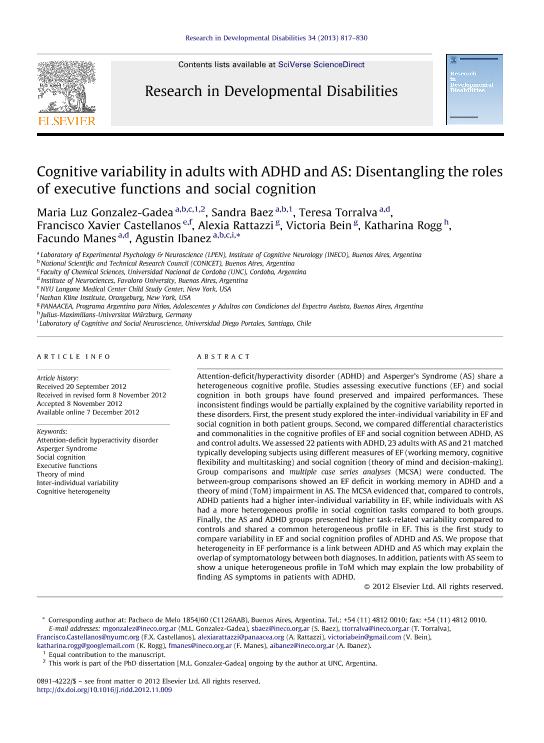Mostrar el registro sencillo del ítem
dc.contributor.author
González Gadea, María Luz

dc.contributor.author
Báez Buitrago, Sandra Jimena

dc.contributor.author
Torralva, Teresa

dc.contributor.author
Castellanos, Francisco Xavier
dc.contributor.author
Rattazzi, Alexia
dc.contributor.author
Bein, Victoria
dc.contributor.author
Rogg, Katharina
dc.contributor.author
Manes, Facundo Francisco

dc.contributor.author
Ibañez, Agustin Mariano

dc.date.available
2019-08-23T20:49:53Z
dc.date.issued
2013-02
dc.identifier.citation
González Gadea, María Luz; Báez Buitrago, Sandra Jimena; Torralva, Teresa; Castellanos, Francisco Xavier; Rattazzi, Alexia; et al.; Cognitive variability in adults with ADHD and AS: Disentangling the roles of executive functions and social cognition; Elsevier; Research in Developmental Disabilities; 34; 2; 2-2013; 817-830
dc.identifier.issn
0891-4222
dc.identifier.uri
http://hdl.handle.net/11336/82066
dc.description.abstract
Attention-deficit/hyperactivity disorder (ADHD) and Asperger's Syndrome (AS) share a heterogeneous cognitive profile. Studies assessing executive functions (EF) and social cognition in both groups have found preserved and impaired performances. These inconsistent findings would be partially explained by the cognitive variability reported in these disorders. First, the present study explored the inter-individual variability in EF and social cognition in both patient groups. Second, we compared differential characteristics and commonalities in the cognitive profiles of EF and social cognition between ADHD, AS and control adults. We assessed 22 patients with ADHD, 23 adults with AS and 21 matched typically developing subjects using different measures of EF (working memory, cognitive flexibility and multitasking) and social cognition (theory of mind and decision-making). Group comparisons and multiple case series analyses (MCSA) were conducted. The between-group comparisons showed an EF deficit in working memory in ADHD and a theory of mind (ToM) impairment in AS. The MCSA evidenced that, compared to controls, ADHD patients had a higher inter-individual variability in EF, while individuals with AS had a more heterogeneous profile in social cognition tasks compared to both groups. Finally, the AS and ADHD groups presented higher task-related variability compared to controls and shared a common heterogeneous profile in EF. This is the first study to compare variability in EF and social cognition profiles of ADHD and AS. We propose that heterogeneity in EF performance is a link between ADHD and AS which may explain the overlap of symptomatology between both diagnoses. In addition, patients with AS seem to show a unique heterogeneous profile in ToM which may explain the low probability of finding AS symptoms in patients with ADHD.
dc.format
application/pdf
dc.language.iso
eng
dc.publisher
Elsevier

dc.rights
info:eu-repo/semantics/openAccess
dc.rights.uri
https://creativecommons.org/licenses/by-nc-nd/2.5/ar/
dc.subject
Asperger Syndrome
dc.subject
Attention-Deficit Hyperactivity Disorder
dc.subject
Cognitive Heterogeneity
dc.subject
Executive Functions
dc.subject
Inter-Individual Variability
dc.subject
Social Cognition
dc.subject
Theory of Mind
dc.subject.classification
Psicología

dc.subject.classification
Psicología

dc.subject.classification
CIENCIAS SOCIALES

dc.title
Cognitive variability in adults with ADHD and AS: Disentangling the roles of executive functions and social cognition
dc.type
info:eu-repo/semantics/article
dc.type
info:ar-repo/semantics/artículo
dc.type
info:eu-repo/semantics/publishedVersion
dc.date.updated
2019-06-10T14:27:55Z
dc.journal.volume
34
dc.journal.number
2
dc.journal.pagination
817-830
dc.journal.pais
Países Bajos

dc.description.fil
Fil: González Gadea, María Luz. Instituto de Neurología Cognitiva; Argentina. Universidad Nacional de Córdoba. Facultad de Ciencias Químicas; Argentina. Consejo Nacional de Investigaciones Científicas y Técnicas; Argentina
dc.description.fil
Fil: Báez Buitrago, Sandra Jimena. Consejo Nacional de Investigaciones Científicas y Técnicas; Argentina. Instituto de Neurología Cognitiva; Argentina
dc.description.fil
Fil: Torralva, Teresa. Instituto de Neurología Cognitiva; Argentina. Universidad Favaloro. Facultad de Medicina. Instituto de Neurociencias; Argentina. Consejo Nacional de Investigaciones Científicas y Técnicas; Argentina
dc.description.fil
Fil: Castellanos, Francisco Xavier. NYU Langone Medical Center Child Study Center; Estados Unidos. Nathan Kline Institute; Estados Unidos
dc.description.fil
Fil: Rattazzi, Alexia. Programa Argentino para Niños, Adolescentes y Adultos con Condiciones del Espectro Autista; Argentina
dc.description.fil
Fil: Bein, Victoria. Programa Argentino para Niños, Adolescentes y Adultos con Condiciones del Espectro Autista; Argentina
dc.description.fil
Fil: Rogg, Katharina. Universität Würzburg; Alemania
dc.description.fil
Fil: Manes, Facundo Francisco. Consejo Nacional de Investigaciones Científicas y Técnicas; Argentina. Universidad Favaloro. Facultad de Medicina. Instituto de Neurociencias; Argentina. Universidad Favaloro; Argentina
dc.description.fil
Fil: Ibáñez Barassi, Agustín Mariano. Consejo Nacional de Investigaciones Científicas y Técnicas; Argentina. Instituto de Neurología Cognitiva; Argentina. Universidad Diego Portales; Chile. Universidad Nacional de Córdoba. Facultad de Ciencias Químicas; Argentina
dc.journal.title
Research in Developmental Disabilities
dc.relation.alternativeid
info:eu-repo/semantics/altIdentifier/url/http://www.sciencedirect.com/science/article/pii/S0891422212002909
dc.relation.alternativeid
info:eu-repo/semantics/altIdentifier/doi/http://dx.doi.org/10.1016/j.ridd.2012.11.009
Archivos asociados
